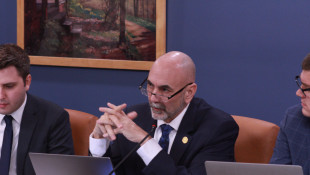For the first time in its 58-year history, Medicare, the public health insurance program for seniors, will have the power to ask for price cuts from drugmakers thanks to the Inflation Reduction Act passed last year.
This morning, the U.S. Department of Health and Human Services released its list of the first 10 drugs that Medicare will take aim at for price negotiations with drugmakers.
This new negotiating power could save the federal government nearly $100 billion by 2031 and slash some prices Medicare pays by half. Drugmakers are bracing for a major shakeup in how Medicare, one of their largest customers, does business.
The new list includes some of the costliest drugs for Medicare. The government paid $50.5 billion for these 10 drugs and people on Medicare who take these drugs paid a total of $3.4 billion in out-of-pocket costs in 2022, according to HHS.
The list of drugs includes:
- blood thinners Eliquis and Xarelto
- diabetes drugs Jardiance, Januvia, Farxiga and Fiasp/Novolog insulin
- Autoimmune diseases drugs like Enbrel and Stelara, which are used to treat rheumatoid arthritis, psoriasis and Crohn's disease
- Imbruvica, a drug that treats blood cancers
The price negotiations will start in 2023 and 2024 but the lower prices will kick in starting 2026. What will the process look like and how are pharmaceutical companies responding?
Farah Yousry, WFYI and Side Effects Public Media’s managing editor, spoke with Leslie Walker, senior producer at the health policy podcast Tradeoffs, to break it down. (You can also learn more about the issue from prior reporting on WFYI)
Farah Yousry: Fill us in here, Leslie, how has drug pricing typically worked in the U.S. and what's about to change?
Leslie Walker: So usually drug companies set their own prices. But insurance companies get some negotiating power, they can bring those prices down and pay less than the sticker price. But that hasn't been the case for Medicare, the federal Insurance program that covers some 65 million people, even though it's one of the industry's biggest customers.
Medicare spends north of $100 billion a year on drugs. Medicare’s actually been forbidden from negotiating until Congress passed the inflation Reduction Act of last year. Now Medicare is about to start their first ever negotiations beginning with 10 of the highest cost drugs.
FY: This sounds like really good news for patients. I know one in four seniors struggles to afford their drugs. But it also sounds like something that drug makers would strongly oppose, are they doing anything to try to stop this?
LW: You're absolutely right. They are very opposed to this. And for good reason. They stand to lose a few $100 billion from these negotiations. Now, if you talk to them, they say it's not really about the dollars, it's about the drugs; that if you take too much money, too many profits out of the system, companies aren't going to have any more incentive to kind of make the costly, risky investments, you need to discover the next cure for cancer for example.
“We may not see the immediate impact of this on innovation tomorrow, but we're definitely going to see it for patients 10 years from now, patients 20 years from now,” said Lauren Nevus, from PhRMA, the industry trade group.
Drug companies and the trade groups who represent them have already filed eight lawsuits trying to stop these negotiations.
FY: So, assuming that these negotiations do move forward, despite those objections from the industry, what will the process look like?
LW: First, the drug companies that make those 10 drugs have to decide by October 2023 if they'll agree to take a seat at the negotiating table. If they don't, they face some massive financial penalties. And then for those negotiations that do move forward, Medicare first has to answer this one big, hairy question: What is a fair price to pay for those prescription drugs?
They're going to consider a bunch of factors like how well these drugs work compared to other –– maybe cheaper –– treatments for similar diseases? How many patents do they have?
Other countries that do similar negotiations use pretty rigid formulas or recipes for figuring out a fair price. But so far, Medicare said they plan to take a different, more flexible approach.
FY: Once Medicare lands on that fair price –– that discount they're going to demand –– what happens then?
LW: By February 2024, Medicare is going to make that first opening offer, then drugmakers get one chance to kind of formally counter that offer, and then the two go back and forth, negotiating for a few more months.
But by August 2024, Medicare gets to basically say: “That's it, this is our best and final offer. And you drug companies can either take it or pay some very steep penalties.”
FY: Medicare just announced the first 10 drugs to go through this process that you just described. What should we know about them?
LW: They are among Medicare's highest cost drugs.
Take the drug Eliquis, for example, which treats blood clots and prevents strokes. In just one year, Medicare spent about $12 billion on that drug, not including, some discounts they do get from drug makers. And for patients, it could cost anywhere from $40 to $500 a month depending on their insurance.
But it’s important to note that we are only talking about a pretty small slice of the more than 3,000 drugs Medicare covers. In order to be eligible for negotiation, a drug has to have been on the market for at least several years and have no generic competition.
That means for a lot of other high cost drugs you might have heard about like those weight loss drugs or maybe those new Alzheimer's treatments, those aren't going to be eligible for this negotiation process for quite some time.
(This transcript was edited for clarity and style)
Side Effects Public Media is a health reporting collaboration based at WFYI in Indianapolis. We partner with NPR stations across the Midwest and surrounding areas — including KBIA in Missouri, Iowa Public Radio, Ideastream in Ohio and WFPL in Kentucky.
 DONATE
DONATE







 View More Articles
View More Articles



 Support WFYI. We can't do it without you.
Support WFYI. We can't do it without you.